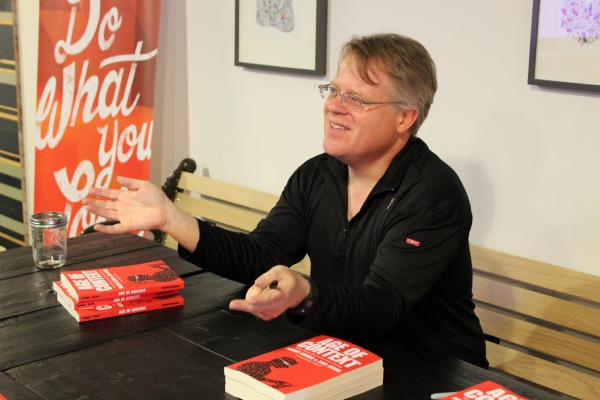
You probably know tech pundit Robert Scoble from his experiences as an early adopter of Google Glass. But long before he showered with the high-tech specs, the 49-year-old spent three years as Microsoft’s technology evangelist for Windows.
It’s been nearly a decade since he’s worked in Redmond, but Scoble has some simple business advice for his former employer: Ditch Windows Phone.
“That train has sailed,” said Scoble, who’s now at Rackspace as its Startup Liason Officer. “The real answer is, give up Windows Phone, go Android, and embrace and extend like you did with the Internet. But they don’t listen to me.”
We caught up with Scoble after his talk at a WTIA event on Tuesday afternoon in Seattle, where he was promoting Age of Context, his latest book with co-author Shel Israel.
Scoble, who was well known for the blog he maintained while working at Microsoft, talked about Microsoft’s reputation in the mobile space and why San Francisco is the “center of the world.” Read on for edited excerpts from our chat:

GeekWire: OK, you worked at Microsoft for three years starting in 2003. What are your thoughts on where the company is today, especially as it goes through some big changes?
Robert Scoble: “The problem with Microsoft is that it’s so committee-driven and slow. It’s not a startup anymore. It’s a big-ass company with a lot of people. And let’s be honest — you work at a big company because it’s comfortable. You don’t have to work 80 hours per week and you get paid, have nice benefits, and the family is all happy. It’s collected a lot of those kinds of people and they are all in committees. Committees don’t do anything. I don’t know if Satya will change that. He’s trying. He did a hackathon today, that seems cool.”
GW: But it sounds like you’re not confident about Microsoft’s future, particularly against companies like Google, Apple, and Amazon.
Scoble: “The problem is that Microsoft has 4 percent market share for mobile. The reason for that is that they have no apps, and there’s no love for developers of apps. When you go to hackathons in San Francisco — and not Seattle, because San Francisco is the center of the world, not Seattle. Sorry, that’s the way it is.
GW: Wait — I want to hear why you think San Francisco is the center of the world.

Scoble: Because it’s the center of the fucking world. You see 6,000 times more tech companies in San Francisco than you see in Seattle. All the money is in San Francisco when you look at the venture fund maps. The PR is in San Francisco. The centricity of the industry is in San Francisco.
So when you go to a San Francisco hackathon, you go to a Tel Aviv hackathon, you go to a Shanghai hackathon, you do not see Windows Phones. That’s the problem. You have lost the mobile war. That means you are screwed as a company that makes me think you have a future.
Now, Satya did something very smart. He made a deal with Apple. His team sat down with Apple, and said, ‘We are going to make a deal. You get rid of Google on that little iPhone thing, and we’ll put in Office.’ Brilliant. Now, at least Microsoft has a finger in the cool iPhone. Maybe they can build off that. That’s where I would be building off of.
But Windows Phone? I don’t know how you get developers excited by that. I don’t understand how you get influencers excited by that. We have decided our phones; we’re not going to switch just because Microsoft says to switch. Is Microsoft going to get Brazil? I don’t care. It doesn’t matter. Well, it does to someone, but it doesn’t matter to the narrative of this story. Because I’m sorry, if you don’t win in San Francisco, you don’t win in the tech industry.

GW: And that’s just going to be the way it is?
Scoble: That’s the way it is — until it switches to Beijing (laughs).
GW: I’m still interested in your Seattle vs. San Francisco comments. We’ve discussed the comparisons between the two startup hubs many times on GeekWire. What do you think about Seattle’s future as a startup city, especially if the Bay Area continues to be the “center of the world?”
Scoble: “Seattle is one of the tech hubs. It’s important to the world — it has Amazon, Microsoft, Starbucks, Boeing, Paccar, a lot of gaming companies, a lot of startups. I mean, look at the Zillow deal from this week — Seattle is very important to the world.
But it’s just not San Francisco. It’s never going to be. So, why even try to be San Francisco? Be Seattle. That’s the way to do it.
But if I was a Microsoft strategist, I would not be living in Seattle right now. I’d be living in San Francisco or Beijing or Tel Aviv or London or Berlin or New York City. I would get out of the bubble here. There is a culture here that is different than the rest of the world and it is a Microsoft company culture.”
GW: What exactly is a Microsoft company culture?
Scoble: “The minute I get off the plane, I see Windows Phones. I do not see Windows Phones anywhere in the world except Seattle. You got to get away from this culture where you don’t understand the market. You need to understand why the developers don’t like you. You got to hang out at a hackathon — not the Seattle hackathons where there are Windows Phones because it’s a Microsoft world. Go to some place else in the world where there’s a hackathon and convince them to get a Windows Phone. Then I’ll start saying different things about Microsoft.”



